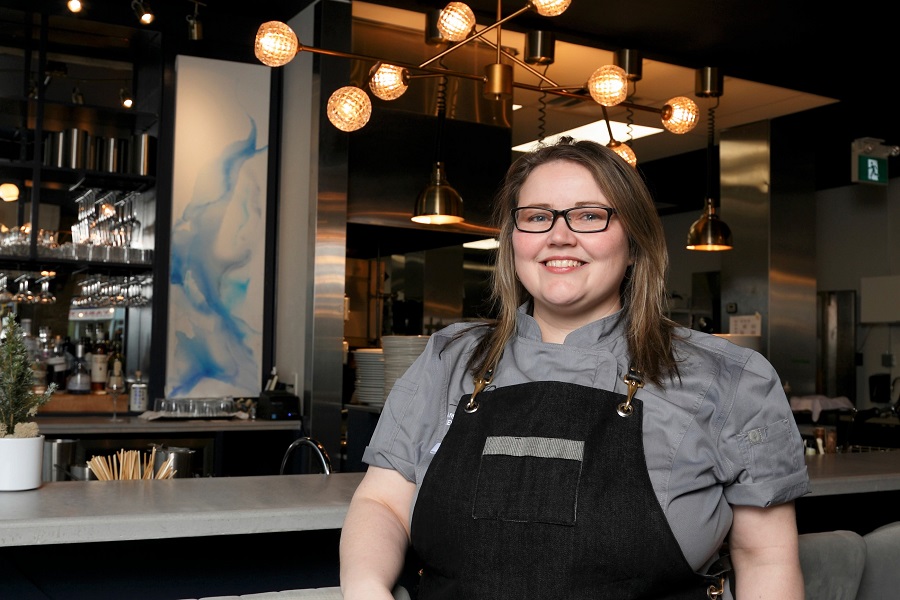So, You Want My Job: Chef/Restaurateur
Angie Murphy of fine-dining restaurant Grace talks about the long-hours payoff, the zero-notice walkout and the goal of sustainable enterprise
Photo: Angie Murphy
ANGIE MURPHY OWNS and operates Grace, a fine-dining restaurant that will celebrate its first anniversary in May. Named after her grandmother, the business opened on Dundas Street at the height of downtown flex street construction.
Murphy, 34, graduated from London South Collegiate Institute, and then from the Stratford Chefs School nine years ago. After working as executive chef at Windermere Manor for five years, she spent a summer at Okazu in Stratford before following her dream and opening her own place.
The dream came true with the help of family, some of whom are investors in the restaurant. It seats 93, but will add capacity with a patio this summer. There are 16 employees. Murphy likes to draw and paint and spend time outdoors gardening. She’s also a fan of many podcasts, but, “I’m basically always working.”
Perhaps no one celebrated the completion of the flex street construction more than you. How’s your first year going?
Things are going well. The reviews have been great. There is buzz. The first year was always going to be tough and I knew that. I knew what we were getting into with the construction when I signed the lease and for the short term it was hard, but it is over now. We got into the neighbourhood at the beginning of something great, and I am confident in the potential of Dundas Place going forward. People are still finding us. People are telling their friends and their friends are finding us. It’s building.
How has the reality of running your own place compared with your hopes and expectations?
Honestly, it’s an enormous relief. The constraints of working in a corporate environment with too many managers and never enough workers, working 70 to 80 hour weeks to save someone else’s bottom line, never having enough trust to put out challenging or artistically satisfying menus, constantly being told that the London market doesn’t care about good food or food politics—those are the things that were draining and impossible to deal with. At least I know that if I’m working those long hours it directly benefits my guests, my staff, my family, my business and eventually comes back to me. I know that the work I am doing agrees with my ethics and is meaningful to me, to the farmers we work with and to other local businesses we support. There have been more than a few challenges and it is definitely not all creativity and fun. There is a steep learning curve on how to fix an ice machine and how to wire ethernet cables through a wall, and I really miss having someone else worry about taxes and payroll, but that’s the trade-off and I’ll take it every time.
One pleasant surprise?
London is ready for the kind of restaurant I want to cook in, and I want to eat at, and we are so excited about it.
One unpleasant surprise?
Sometimes people say they want to work as a dishwasher, and you tell them the job is dirty and monotonous and they will work late hours. And they tell you they are happy to join your incredibly talented team of wonderfully nice people, and then four shifts in they quit in the middle of a busy Friday night, zero notice, and literally everyone else in the restaurant has to suffer for it. They never show up again, but you still have to do three hours of paperwork just to terminate them. That’s an unpleasant surprise that keeps on giving. Four times so far in seven months. That said, we’ve got some great dishwashers now and I come in every day praying they will make it.
Describe a typical day.
There are not typical days in a restaurant. That’s part of the draw, I think. I get to work around 11 a.m. or noon. On Wednesdays, I do admin all day and it’s pretty uneventful. On a Saturday, I will probably come in and do an hour of upkeep admin tasks, answering emails and finalizing plans for things like upcoming events. I’ll have an Americano and catch up with the early crew and go over what they will be prepping that day. I’ll spend the mid-afternoon prepping, helping my sous chefs get prepared for dinner and setting things up well for the weekend. We do a special Sunday dinner every week that is fun and creative. I usually work on that.
You always have to be thinking a few days ahead as the head chef. The cooks and the sous chefs are bogged down with the day-to-day, making sure everything is there for service. I make sure the kitchen has communicated any menu changes to the GM so she can print new menus if required. I check in with the service staff for the evening to see if they have any questions and to make sure everything is covered. At 4:30 p.m. we have staff meal.
On a busy night, I will work as expeditor on the hotline during service. Basically, reading out the orders and making sure each station is preparing the right food in the right order. I’ll sauce the plates and put on final garnishes, inspect for quality, call for the plates to be picked up and carefully explain what dishes are going to what seat, and at what table. After the busy rush, I consult with the sous chefs about ordering and work on new dishes. We talk about how service went and what we want to change next.
We learn new things every day about how we operate and it’s important to debrief. It’s getting so that I don’t stay until close every night. I usually stay on Saturday and Sunday though, to make sure the cash-outs go well at the end of our week. I reconcile the cash and supervise the close until about midnight and then lock up. I go home and watch Stephen Colbert to unwind, usually eat a bowl of cereal, shower and go to bed.

Your plan was to democratize the staffing to some extent. What’s the practical effect of that approach?
It’s an adjustment for sure. We aren’t as far as I want to be. There are fundamental pieces in place like the tip pooling and the living wage that are making a real difference. I try to incorporate the cross-curricular training as often as possible, but it’s difficult when you have a staff with different levels of experience. On a busy night, it is hard to put your sous chef on the floor to serve tables when he is more effective in the kitchen, for example, and it has been tough to transition experienced servers into kitchen rolls, but we are coming closer to the ideal every day. There is always more I want to do for the staff as well, but we need the revenue to support it. I hope people know that when they come to eat at Grace, they are supporting a sustainable enterprise. Their dollars spent mean that our staff will get health benefits and wage increases, that we will spend those dollars back out into the local economy, we will support local vendors and farmers and help create a better living for a lot of deserving hard-working people.
What would your grandmother think about Grace?
I think she would get a kick out of it. She would love to see our family working together. She grew up on a farm near Teeswater then moved to London in the 1940s. I think she would appreciate the artistry and creativity of it even if she didn’t necessarily have the most refined palate for fine dining. She would be proud that we treat people fairly, and I think she would like the vibe. She was a lively, witty, wonderful woman who was the life of the party. Grace lived downtown on Dundas and worked at a drug store across the street from our current location, so I think she would appreciate that we are bringing new life to this corner as well. Also, she would have loved the ice cream. She loved ice cream and we make ours fresh in-house. ![]() Interview by Christopher Clark
Interview by Christopher Clark

